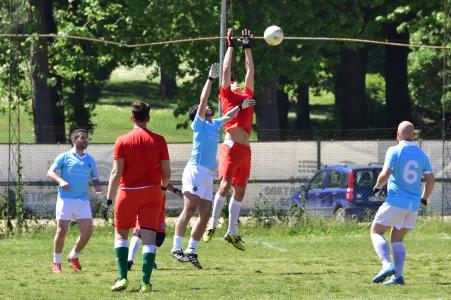Pope Francis is a well-known soccer fan. His favourite team is San Lorenzo de Almagro, one of the most important teams in Argentina, and the Pontiff still keeps his membership card for the team.
However, thanks to the efforts of an Irish priest, Pope Francis may find a new love for the GAA, with the Vatican putting together its own young Gaelic football team.
Msgr Joseph Murphy, from Dunamore in Co. Cork, has worked in the Vatican Secretariat of State for almost 20 years.
Back in 2007 he began to work with the Saints Peter and Paul Association, an association of the faithful set up in 1970 by Blessed Pope Paul VI after he dissolved the Palatine Guard, as a way to enable former guards to continue serving the Holy See on a voluntary basis. The members of the association must be residents of Rome or Vatican City State and must be at least 18 years of age.
Chaplain
“It’s a body that is probably not well known outside of Rome,” says Msgr Murphy, who is their chaplain. “It is more in the background than the like of the Swiss Guard. The work is more humble, basically voluntary service, but at the same time there are always a lot of requests from people to join.”
He says his role as chaplain is mainly “the spiritual care and pastoral guidance of the members of association”. “So in practical terms it means celebrating Sunday Mass, organising catechesis, religious formation and other moments of prayer, sometimes retreats and pilgrimages. I am also the point of contact between the association and the Secretariat of State, which is the body on which the association depends.”
The association also has a youth group, created in 2010, called the Blessed Pier Giorgio Frassati or Student Group (Gruppo Allievi).
The Allievi engage in various religious, cultural, charitable and sport activities, organised by the association’s chaplains and the group leaders, which are aimed at ensuring their overall human formation.
Holy Year
“One of the big moments for the Allievi in the recent past was when they served Mass with the Pope for the opening of the Holy Year,” says Msrg Joseph.
“Pope Francis is quite used to them at this stage. He always comes a little early and, maybe to put people at their ease, he speaks with each of them beforehand. We were lucky to have the possibility of various occasions over the past few years to serve with the Pope. So they have all had a chance to meet him and some have served quite often.”
From a sporting perspective some of the Allievi have taken part in a training course organised every year by the Italian Referees Association and regularly referee soccer matches organised by the Italian Football Association (FIGC). However, last year a new sports activity was introduced with the assistance of the Lazio Gaelic Football Club.
“It came about through a providential set of circumstances and in part having an Irish chaplain helps,” says Msgr Murphy. “Last summer at home in Cork, I saw that the GAA World Games were on in Dublin and I hadn’t realised before that there were so many people, who are not of Irish background, who play the game in all parts of the world. Upon further investigation I found the game was already being played in Italy for the last five or six years by a number of clubs.
“So when I got back to Rome I talked to our young people to see if they were interested. It turned out that one of them had been on an exchange in Dublin a few years ago and had played it and was enthusiastic. As often happens when you have one young person who is involved in something, they usually draw others with them.
“So we got in contact with Lazio Gaelic Football Club and they were more than delighted to assist us, as they were also hoping to get new players as well.”
The Lazio club was founded in 2012 as Rome Gaelic Football Club by a number of Irish players. On becoming part of the Lazio multisport society in 2015 it changed its name. In the space of just a few years, the men’s team had become predominantly Italian, while the ladies’ team is still dominated by English speakers.
A number of Allievi agreed to take part in the club’s weekly training sessions and in the space of a few months succeeded in learning the basic skills and tactics of Gaelic football.
Much faster
“Most of them were soccer players so the difficulty for them was getting into the way of thinking of Gaelic football, which involves use of the hands and is a lot faster. Once they got into it, they really enjoyed it,” says Msgr Murphy.
“There was a fair commitment involved in terms of weekly training and preparing for matches. Some of our players play soccer with a local team and after Gaelic training on a Wednesday night went off to soccer training. All we can say is that it is great to be young and to be able to do that!”
While officially members of Lazio Gaelic Football Club, because they have their own specific identity some friendly matches were arranged between the Allievi and the more experienced Lazio team. The fourth match was played at the end of April in the presence of Ireland’s Ambassador to the Holy See, Emma Madigan, who organised a reception and prize-giving ceremony to recognise the players’ achievements.
Msgr Murphy says that while it is too soon to speak of a Vatican GAA team, it is hoped that this young all-Italian Gaelic football team, closely connected to the Vatican, will continue to grow and attract more players in the years ahead.
“Those who played this year want to continue next year and if we get a few more signed up who knows where it will go from there,” he says.
“One problem is that there are very few GAA teams in Italy and they are far apart, so the opportunities to play matches are few and far between.
“Here in Rome having our Allevi with the Lazio team, gives the Lazio players a chance to practise that they wouldn’t otherwise have.
“We are hoping that in time it will catch on. A number of members have come to watch the matches and have been quite excited by it. There is also a hope that some Irish team could come over to Rome and it would be interesting to organise a match with Lazio, maybe in the form of a tournament.”


 Mags Gargan
Mags Gargan